人教新目标(Go for it)版八年级下册Unit 6 An old man tried to move the mountains. Section A 1a-2d课件(共58张PPT)
文档属性
| 名称 | 人教新目标(Go for it)版八年级下册Unit 6 An old man tried to move the mountains. Section A 1a-2d课件(共58张PPT) | 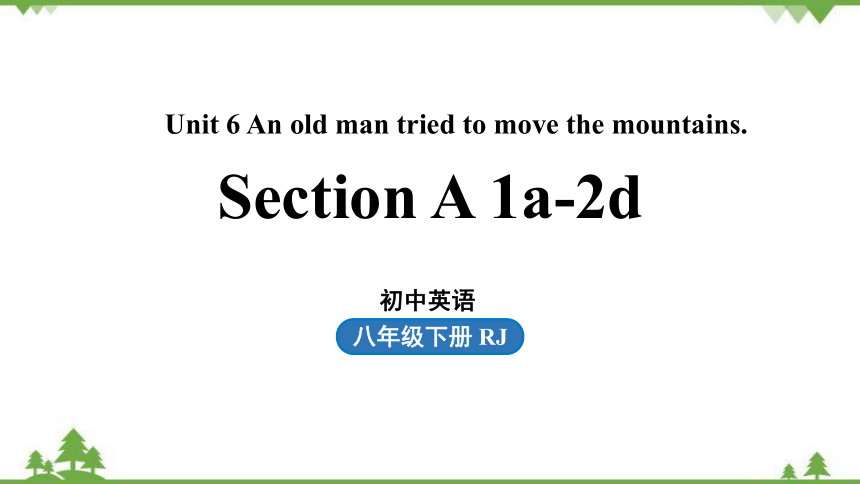 | |
| 格式 | pptx | ||
| 文件大小 | 3.5MB | ||
| 资源类型 | 教案 | ||
| 版本资源 | 人教新目标(Go for it)版 | ||
| 科目 | 英语 | ||
| 更新时间 | 2022-11-01 21:09:54 | ||
图片预览

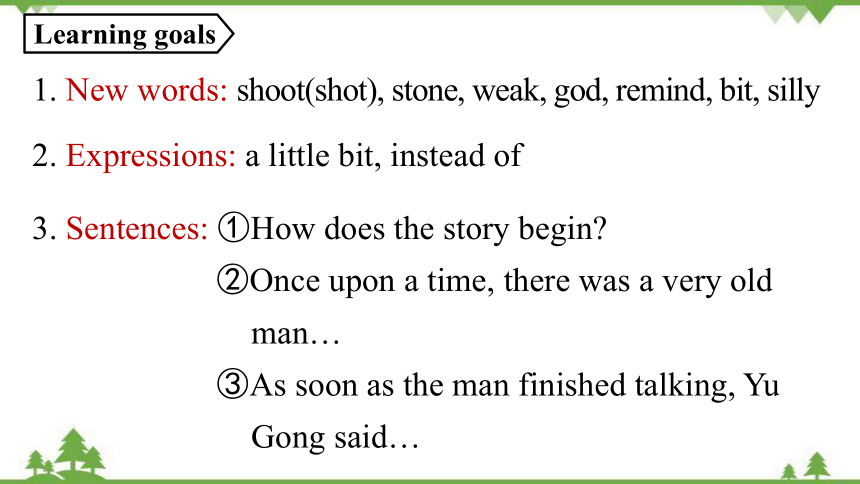
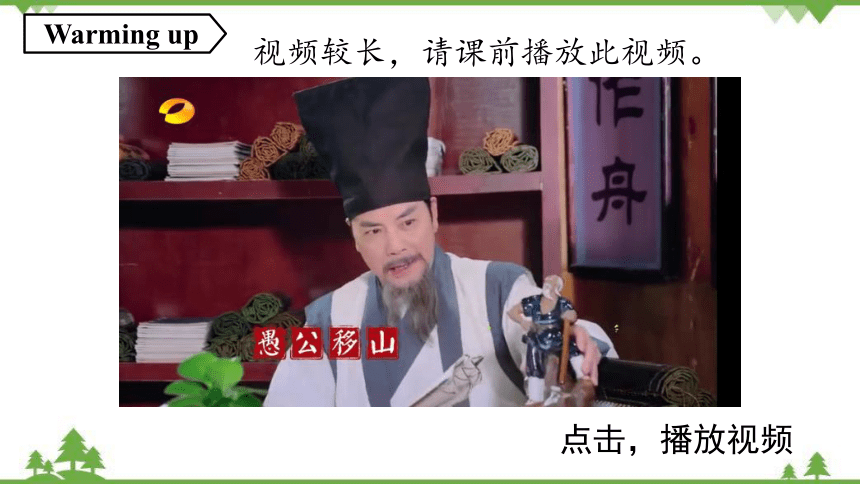
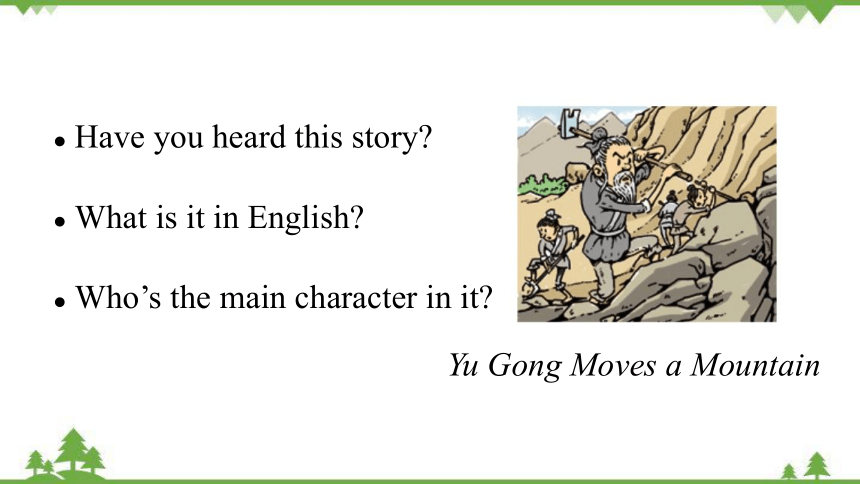
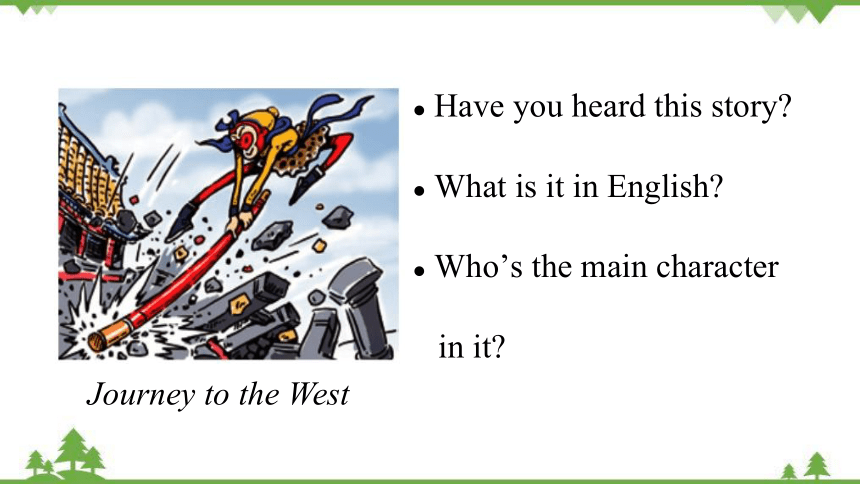
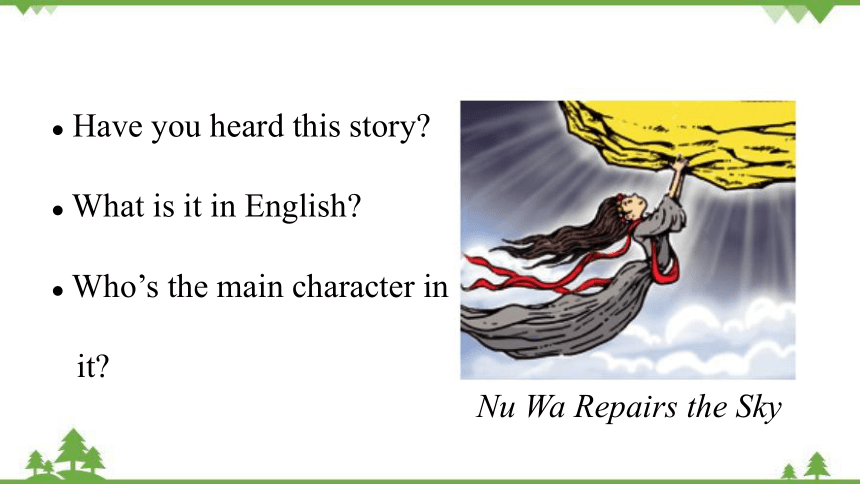
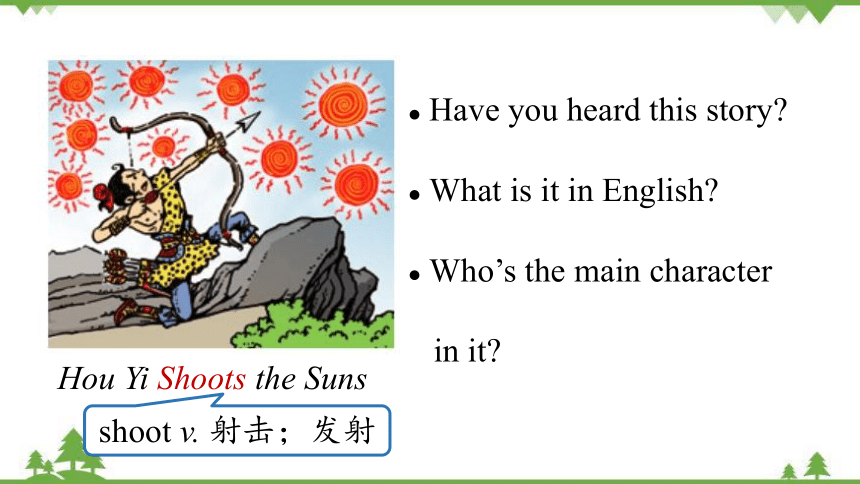
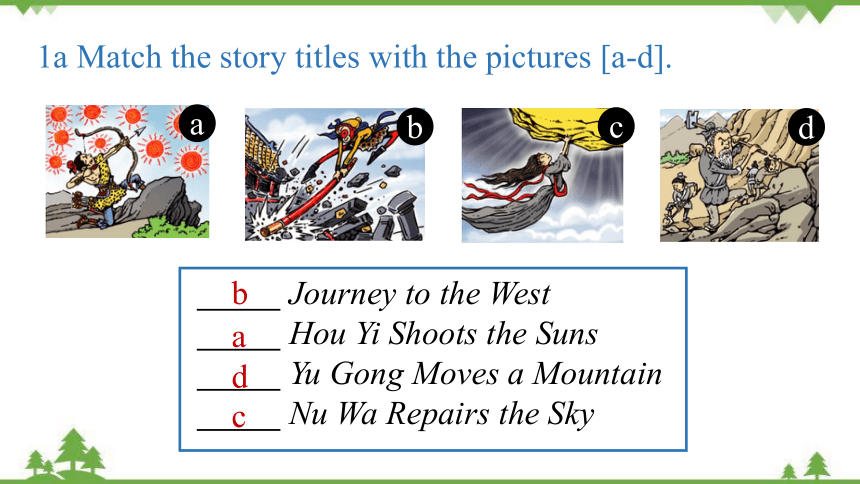
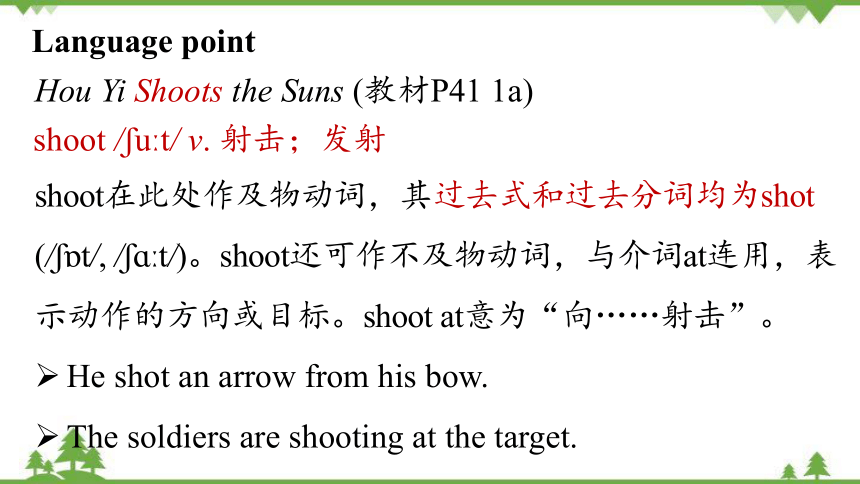
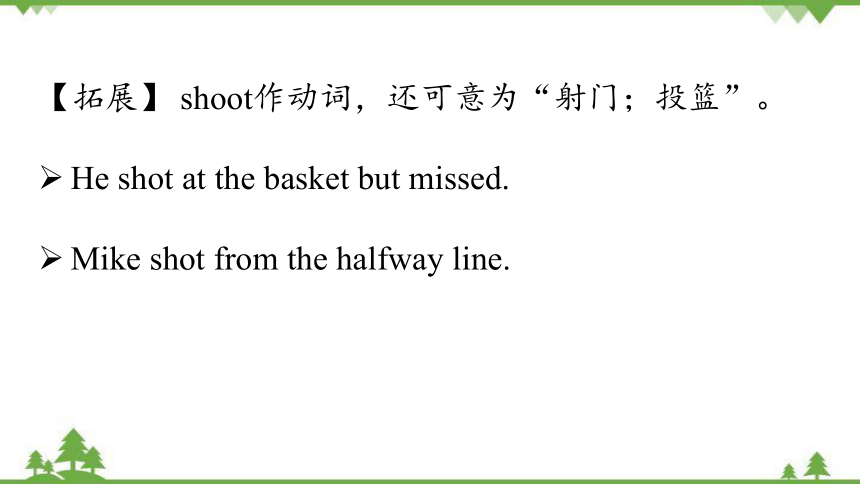
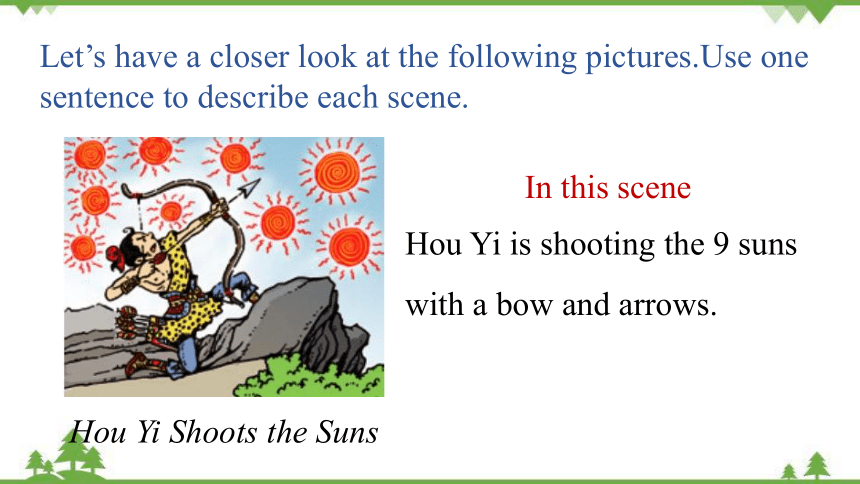
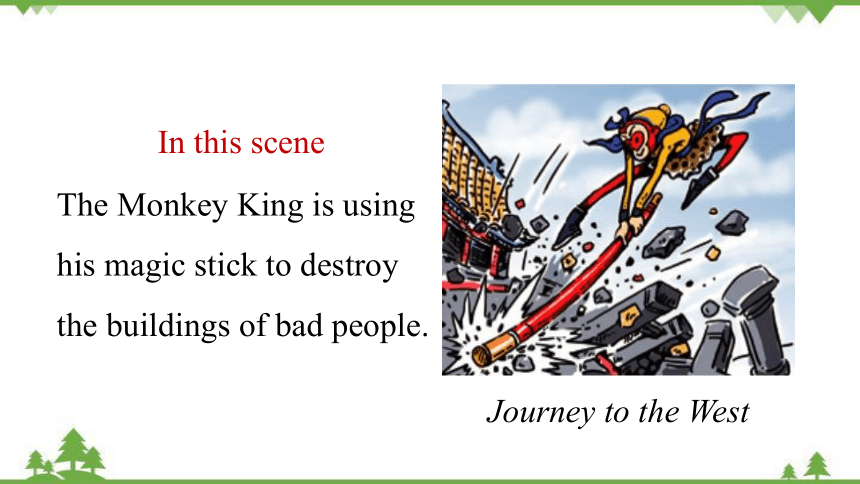
文档简介
(共58张PPT)
Section A 1a-2d
Unit 6 An old man tried to move the mountains.
初中英语
八年级下册 RJ
1. New words: shoot(shot), stone, weak, god, remind, bit, silly
3. Sentences: ①How does the story begin
②Once upon a time, there was a very old
man…
③As soon as the man finished talking, Yu
Gong said…
2. Expressions: a little bit, instead of
Learning goals
点击,播放视频
视频较长,请课前播放此视频。
Warming up
Yu Gong Moves a Mountain
Have you heard this story
What is it in English
Who’s the main character in it
Have you heard this story
What is it in English
Who’s the main character
in it
Journey to the West
Nu Wa Repairs the Sky
Have you heard this story
What is it in English
Who’s the main character in
it
Hou Yi Shoots the Suns
Have you heard this story
What is it in English
Who’s the main character
in it
shoot v. 射击;发射
Journey to the West
Hou Yi Shoots the Suns
Yu Gong Moves a Mountain
Nu Wa Repairs the Sky
a
b
c
d
1a Match the story titles with the pictures [a-d].
b
d
a
c
Hou Yi Shoots the Suns (教材P41 1a)
shoot / u t/ v. 射击;发射
shoot在此处作及物动词,其过去式和过去分词均为shot (/ t/, / ɑ t/)。shoot还可作不及物动词,与介词at连用,表示动作的方向或目标。shoot at意为“向……射击”。
He shot an arrow from his bow.
The soldiers are shooting at the target.
Language point
【拓展】 shoot作动词,还可意为“射门;投篮”。
He shot at the basket but missed.
Mike shot from the halfway line.
Let’s have a closer look at the following pictures.Use one sentence to describe each scene.
Hou Yi is shooting the 9 suns
with a bow and arrows.
Hou Yi Shoots the Suns
In this scene
The Monkey King is using
his magic stick to destroy
the buildings of bad people.
In this scene
Journey to the West
Nu Wa is working hard to
repair the sky.
In this scene
Nu Wa Repairs the Sky
The old man Yu Gong and his family are digging rocks and
earth from a mountain together.
In this scene
Yu Gong Moves a Mountain
The two mountains were very high and big.
A very old man tried to move the mountains.
A man told Yu Gong that he could never do it.
√
√
1b Listen and check (√) the facts you hear. Which story are
Anna and Wang Ming talking about
Anna and Wang Ming are talking about Yu Gong Moves a Mountain.
Wang Ming: Hi, Anna. In my Chinese class today, we read a famous story called Yu Gong Moves a Mountain.
Anna: Oh, how does the story begin
Wang Ming: Well, once upon a time, there was a very old man. There were two mountains near his house. They were so high and big that it took a long time to walk to the other side.
Anna: So what happened next
Listen and read.
Wang Ming: Well, the old man told his family that they should all help him to move the mountains.
Anna: Mm, but an old man probably couldn’t even move
a small tree.
Wang Ming: Yes, that’s what his wife said, too.
Anna: And where would they put all the earth and stone
from the mountains
n. 石头(不可数名词)
Wang Ming: Yu Gong said they could put it into the sea because it’s big enough to hold everything. So they all started digging the next day.
点击,播放视频
1. How does the story begin
2. What happened next
3. Where would they put all the earth and stone
from the mountains
1c Discuss the questions with your partner.
Describe these scenes.
Yu Gong and his family kept on digging day after day and year after year.
A man saw this and told Yu Gong that he could never do it.
Yu Gong and his family began to move some of the earth and stone.
Two gods took the mountains away.
3
2
1
4
2a Listen and number the pictures [1-4] in order to tell
the story.
1. A man saw Yu Gong and his (children / family) when
they were working on moving the mountains.
2. He told Yu Gong he could never do it because he was
old and (poor / weak).
3. As soon as the man finished (talking / speaking), Yu
Gong said that his family could continue to move the
mountains after he died.
Read and try to understand the sentences.
adj. 虚弱的;无力的
4. Finally, a god was so moved by Yu Gong that he
sent (two / three) gods to take the mountains away.
5. This story reminds us that you can never (know / see)
what’s possible unless you try to make it happen.
so… that… 如此……以至于……
send sb. to do sth. 派遣某人做某事
remind v. 提醒;使想起
2b Listen again and circle the words you hear.
1. A man saw Yu Gong and his (children / family) when
they were working on moving the mountains.
2. He told Yu Gong he could never do it because he was
old and (poor/ weak).
3. As soon as the man finished (talking / speaking), Yu
Gong said that his family could continue to move the
mountains after he died.
4. Finally, a god was so moved by Yu Gong that he sent
(two / three) gods to take the mountains away.
5. This story reminds us that you can never (know / see)
what’s possible unless you try to make it happen.
1. He told Yu Gong he could never do it because he was
old and weak. (教材P42 2b)
weak作形容词,在此处意为“虚弱的;无力的”,其反义词为strong(强壮的)。
At the hospital, my body was weak, but my mind was
still very clear.
weak /wi k/ adj. 虚弱的;无力的
Language points
【拓展】 (1) weak作形容词,还可表示“不擅长,(能力)弱的;懦弱的”。be weak in 意为“在…… 方面差”,相当于 be bad at 。
Jim is a little weak in/bad at Chinese.
(2) weak的名词形式为weakness,意为“懦弱;衰弱;
弱点,缺点”。
He thought that crying was a sign of weakness.
2.This story reminds us that you can never know what’s
possible unless you try to make it happen. (教材P42 2b)
remind
remind sb. of … 使某人想起……
remind sb. (not) to do sth. 提醒某人(不要)做某事
remind sb. + 从句 提醒某人……
remind /r ma nd/ v. 提醒;使想起
The movie reminds me of my childhood.
My parents often remind me to study hard.
He reminds me that it is necessary to take some money with me.
Listen and read.
Wang Ming: Let me tell you the rest of the story about Yu
Gong. Yu Gong and his family began to move
some of the earth and stone to the sea.One day,
a man saw Yu Gong and his children when they
were working on moving the mountains. He
told Yu Gong that he could never do it because
he was old and weak. As soon as the man
finished talking, Yu Gong said that his family could continue to move the mountains after he died. His family would live and grow, but the mountains could not get bigger. So Yu Gong and his family kept on digging day after day and year after year. Finally, a god was so moved by Yu Gong that he sent two gods to take the mountains away. This story reminds us that you can never know what’s possible unless you try to make it happen.
2c Look at the pictures in 2a and tell the story in your own
words.
Once upon a time, there was…
And there were… near his house.
They were so… that …
So he decided to…
He thought they could put… into…
Then they began to move… to…
One day, a man saw this and told Yu Gong that he could never… because…
As soon as the man finished talking, Yu Gong said that his
family could continue to… after he died, and his family would… but the mountains could not…
So the family kept on… day after day and...
Finally, a god was so moved by… that he sent… to…
(1) What do you think about the story of Yu Gong
(2) What did they want to do
(3) How did they work out the problem
(4) Do you think it’s a good way to solve the problem
(5) Does it seem possible to move a mountain
After learning the story of Yu Gong, let’s answer the questions.
2d Role-play the conversation.
点击, 播放视频
Read the conversation in 2d and fill the chart.
Wang Ming’s opinion Claudia’s opinion Teacher’s conclusion
1. really interesting
2. a good way to solve the problem
3. anything is possible if you work hard
1. a little bit silly
2. does not seem very possible to move a mountain
3. try to find other ways to solve a problem
many sides to a story and many ways to understand it
Teacher: So what do you think about the story of Yu Gong
Wang Ming: I think it’s really interesting. Yu Gong found a
good way to solve his problem.
Claudia: Really I think it’s a little bit silly. It doesn’t
seem very possible to move a mountain.
adj. 愚蠢的;不明事理的
a little bit 有点儿;稍微
seem在此处作系动词,后接形容词作表语。形容词前也可加to be。
2d Role-play the conversation.
Wang Ming: But the story is trying to show us that anything is possible if you work hard! Yu Gong kept trying and didn’t give up.
Claudia: Well, I still don’t agree with you. I think we
should try to find other ways to solve a problem.
Wang Ming: But what could Yu Gong do instead of moving the mountains
代替;反而
放弃
Claudia: Well, there are many other ways. For example,
he could build a road. That’s better and faster
than moving a mountain!
Teacher: You have different opinions about the story, and
neither of you are wrong. There are many sides
to a story and many ways to understand it.
“neither of +名词/代词复数”作主语时,谓语动词用单数或复数均可
1. I think it’s a little bit silly. (教材P42 2d)
(1) a little bit 常用来修饰形容词或副词及其比较级,相
当于 a little/a bit。
It’s a little bit ( = a little/a bit ) hot today.
You’d better come a little bit earlier tomorrow.
(2) a little bit 还可修饰动词。
Could you turn the TV up a little bit
a little bit 有点儿;稍微
Language points
1. I think it’s a little bit silly. (教材P42 2d)
silly作形容词,既可作定语,也可作表语,其比较级和最高级分别是sillier和silliest。silly侧重指人的言行不符合逻辑或不明智。
That’s a silly question.
I thought it was silly to speak like that.
silly / s li/ adj. 愚蠢的;不明事理的
2. But what could Yu Gong do instead of moving the
mountains (教材P42 2d)
instead 与 instead of 两者都有“代替”的含义,其区别如下:
instead 副词 位于句首或句末,位于句首时常用逗号与后面的内容隔开。
instead of 介词短语 位于句首或句中,后接名词、代词或 v-ing 形式。
instead of 代替;反而
He didn’t reply. Instead, he left the room.
For example, when we go shopping, we can bring cloth
bags instead of plastic ones.
Fill in the blanks according to the conversation.
Teacher: So what do you think about Yu Gong
Wang Ming: I think it’s really interesting. Yu Gong found a good way to .
Claudia: Really I think it’s silly. It doesn’t
_______ very possible to move a mountain.
the story of
solve his problem
a little bit
seem
Wang Ming: But the story is trying to show us that anything is possible if you ! Yu Gong kept trying and didn’t .
Claudia: Well, I still don’t you. I think we
should try to find other ways to solve a problem.
Wang Ming: But what could Yu Gong do moving the mountains
agree with
instead of
work hard
give up
Claudia: Well, there are many other ways. , he
could build a road. That’s better and faster than
moving a mountain!
Teacher: You have different opinions about the story, and
____________ are wrong. There are many sides to
a story and many ways to understand it.
For example
neither of you
Adapt the conversation
A: So what do you think about the story of …
B: I think …
A: Really I think …
B: But the story is trying to show us …
…
1.Most of the houses are built of (石头).
2.— How can we go to the theater, Bruce
— It’s a long way to go. We’d better take the underground
i of walking there.
3.Don’t make a move or I’ll (开枪).
一、根据句意及首字母或汉语提示完成句子。
stone
nstead
shoot
Exercises
4.These pieces of music always r________ me of my old
days.
5.His mother is much (虚弱的) than before. She
can’t even move.
weaker
emind
1.They went to the park instead of________(stay) at home
yesterday afternoon.
2.The police took the man away because he______ (shoot)
endangered animals.
3.Please remind him________(take) medicine on time.
4.It seems easier_______(play) games than to do homework.
二、用括号内所给词的适当形式填空。
staying
shot
to take
to play
1.The medical treatment lasted many months and made
him very _____ . At times, he nearly died.
A. sad B. scared C. poor D. weak
2.—What do you think of the movie Fanghua
—It is moving and it _____ my grandma _____ the life in the country.
A. reminds; of B. lets; down C. wakes; up
三、单项选择
D
A
3.(2021 天津中考)—Shall we go for a walk
— . It’s too dark. We’d better stay at home.
A. Nice idea B. That’s true
C. Don’t be silly D. I agree with you
C
4.(2021 金华中考改编)His achievements were ______ great that he was called the “Father of Hybrid Rice” and won the World Food Prize.
A. so B. very C. such D. quite
A
Key words
Useful
expressions
a little bit, instead of, so...that..., send
sb. to do sth., give up
shoot, stone, weak, god, remind, bit, silly
①How does the story begin
②Once upon a time, there was a very old
man…
③As soon as the man finished talking, Yu
Gong said…
Sentences
Summary
1. Write a well-known story down in English and give
your opinion about this story at the end of your writing.
2. Read and recite the words and phrases in Section A (1a-2d).
3. Preview (Section A 3a-3c).
Homework
THANKS
谢谢聆听!
Section A 1a-2d
Unit 6 An old man tried to move the mountains.
初中英语
八年级下册 RJ
1. New words: shoot(shot), stone, weak, god, remind, bit, silly
3. Sentences: ①How does the story begin
②Once upon a time, there was a very old
man…
③As soon as the man finished talking, Yu
Gong said…
2. Expressions: a little bit, instead of
Learning goals
点击,播放视频
视频较长,请课前播放此视频。
Warming up
Yu Gong Moves a Mountain
Have you heard this story
What is it in English
Who’s the main character in it
Have you heard this story
What is it in English
Who’s the main character
in it
Journey to the West
Nu Wa Repairs the Sky
Have you heard this story
What is it in English
Who’s the main character in
it
Hou Yi Shoots the Suns
Have you heard this story
What is it in English
Who’s the main character
in it
shoot v. 射击;发射
Journey to the West
Hou Yi Shoots the Suns
Yu Gong Moves a Mountain
Nu Wa Repairs the Sky
a
b
c
d
1a Match the story titles with the pictures [a-d].
b
d
a
c
Hou Yi Shoots the Suns (教材P41 1a)
shoot / u t/ v. 射击;发射
shoot在此处作及物动词,其过去式和过去分词均为shot (/ t/, / ɑ t/)。shoot还可作不及物动词,与介词at连用,表示动作的方向或目标。shoot at意为“向……射击”。
He shot an arrow from his bow.
The soldiers are shooting at the target.
Language point
【拓展】 shoot作动词,还可意为“射门;投篮”。
He shot at the basket but missed.
Mike shot from the halfway line.
Let’s have a closer look at the following pictures.Use one sentence to describe each scene.
Hou Yi is shooting the 9 suns
with a bow and arrows.
Hou Yi Shoots the Suns
In this scene
The Monkey King is using
his magic stick to destroy
the buildings of bad people.
In this scene
Journey to the West
Nu Wa is working hard to
repair the sky.
In this scene
Nu Wa Repairs the Sky
The old man Yu Gong and his family are digging rocks and
earth from a mountain together.
In this scene
Yu Gong Moves a Mountain
The two mountains were very high and big.
A very old man tried to move the mountains.
A man told Yu Gong that he could never do it.
√
√
1b Listen and check (√) the facts you hear. Which story are
Anna and Wang Ming talking about
Anna and Wang Ming are talking about Yu Gong Moves a Mountain.
Wang Ming: Hi, Anna. In my Chinese class today, we read a famous story called Yu Gong Moves a Mountain.
Anna: Oh, how does the story begin
Wang Ming: Well, once upon a time, there was a very old man. There were two mountains near his house. They were so high and big that it took a long time to walk to the other side.
Anna: So what happened next
Listen and read.
Wang Ming: Well, the old man told his family that they should all help him to move the mountains.
Anna: Mm, but an old man probably couldn’t even move
a small tree.
Wang Ming: Yes, that’s what his wife said, too.
Anna: And where would they put all the earth and stone
from the mountains
n. 石头(不可数名词)
Wang Ming: Yu Gong said they could put it into the sea because it’s big enough to hold everything. So they all started digging the next day.
点击,播放视频
1. How does the story begin
2. What happened next
3. Where would they put all the earth and stone
from the mountains
1c Discuss the questions with your partner.
Describe these scenes.
Yu Gong and his family kept on digging day after day and year after year.
A man saw this and told Yu Gong that he could never do it.
Yu Gong and his family began to move some of the earth and stone.
Two gods took the mountains away.
3
2
1
4
2a Listen and number the pictures [1-4] in order to tell
the story.
1. A man saw Yu Gong and his (children / family) when
they were working on moving the mountains.
2. He told Yu Gong he could never do it because he was
old and (poor / weak).
3. As soon as the man finished (talking / speaking), Yu
Gong said that his family could continue to move the
mountains after he died.
Read and try to understand the sentences.
adj. 虚弱的;无力的
4. Finally, a god was so moved by Yu Gong that he
sent (two / three) gods to take the mountains away.
5. This story reminds us that you can never (know / see)
what’s possible unless you try to make it happen.
so… that… 如此……以至于……
send sb. to do sth. 派遣某人做某事
remind v. 提醒;使想起
2b Listen again and circle the words you hear.
1. A man saw Yu Gong and his (children / family) when
they were working on moving the mountains.
2. He told Yu Gong he could never do it because he was
old and (poor/ weak).
3. As soon as the man finished (talking / speaking), Yu
Gong said that his family could continue to move the
mountains after he died.
4. Finally, a god was so moved by Yu Gong that he sent
(two / three) gods to take the mountains away.
5. This story reminds us that you can never (know / see)
what’s possible unless you try to make it happen.
1. He told Yu Gong he could never do it because he was
old and weak. (教材P42 2b)
weak作形容词,在此处意为“虚弱的;无力的”,其反义词为strong(强壮的)。
At the hospital, my body was weak, but my mind was
still very clear.
weak /wi k/ adj. 虚弱的;无力的
Language points
【拓展】 (1) weak作形容词,还可表示“不擅长,(能力)弱的;懦弱的”。be weak in 意为“在…… 方面差”,相当于 be bad at 。
Jim is a little weak in/bad at Chinese.
(2) weak的名词形式为weakness,意为“懦弱;衰弱;
弱点,缺点”。
He thought that crying was a sign of weakness.
2.This story reminds us that you can never know what’s
possible unless you try to make it happen. (教材P42 2b)
remind
remind sb. of … 使某人想起……
remind sb. (not) to do sth. 提醒某人(不要)做某事
remind sb. + 从句 提醒某人……
remind /r ma nd/ v. 提醒;使想起
The movie reminds me of my childhood.
My parents often remind me to study hard.
He reminds me that it is necessary to take some money with me.
Listen and read.
Wang Ming: Let me tell you the rest of the story about Yu
Gong. Yu Gong and his family began to move
some of the earth and stone to the sea.One day,
a man saw Yu Gong and his children when they
were working on moving the mountains. He
told Yu Gong that he could never do it because
he was old and weak. As soon as the man
finished talking, Yu Gong said that his family could continue to move the mountains after he died. His family would live and grow, but the mountains could not get bigger. So Yu Gong and his family kept on digging day after day and year after year. Finally, a god was so moved by Yu Gong that he sent two gods to take the mountains away. This story reminds us that you can never know what’s possible unless you try to make it happen.
2c Look at the pictures in 2a and tell the story in your own
words.
Once upon a time, there was…
And there were… near his house.
They were so… that …
So he decided to…
He thought they could put… into…
Then they began to move… to…
One day, a man saw this and told Yu Gong that he could never… because…
As soon as the man finished talking, Yu Gong said that his
family could continue to… after he died, and his family would… but the mountains could not…
So the family kept on… day after day and...
Finally, a god was so moved by… that he sent… to…
(1) What do you think about the story of Yu Gong
(2) What did they want to do
(3) How did they work out the problem
(4) Do you think it’s a good way to solve the problem
(5) Does it seem possible to move a mountain
After learning the story of Yu Gong, let’s answer the questions.
2d Role-play the conversation.
点击, 播放视频
Read the conversation in 2d and fill the chart.
Wang Ming’s opinion Claudia’s opinion Teacher’s conclusion
1. really interesting
2. a good way to solve the problem
3. anything is possible if you work hard
1. a little bit silly
2. does not seem very possible to move a mountain
3. try to find other ways to solve a problem
many sides to a story and many ways to understand it
Teacher: So what do you think about the story of Yu Gong
Wang Ming: I think it’s really interesting. Yu Gong found a
good way to solve his problem.
Claudia: Really I think it’s a little bit silly. It doesn’t
seem very possible to move a mountain.
adj. 愚蠢的;不明事理的
a little bit 有点儿;稍微
seem在此处作系动词,后接形容词作表语。形容词前也可加to be。
2d Role-play the conversation.
Wang Ming: But the story is trying to show us that anything is possible if you work hard! Yu Gong kept trying and didn’t give up.
Claudia: Well, I still don’t agree with you. I think we
should try to find other ways to solve a problem.
Wang Ming: But what could Yu Gong do instead of moving the mountains
代替;反而
放弃
Claudia: Well, there are many other ways. For example,
he could build a road. That’s better and faster
than moving a mountain!
Teacher: You have different opinions about the story, and
neither of you are wrong. There are many sides
to a story and many ways to understand it.
“neither of +名词/代词复数”作主语时,谓语动词用单数或复数均可
1. I think it’s a little bit silly. (教材P42 2d)
(1) a little bit 常用来修饰形容词或副词及其比较级,相
当于 a little/a bit。
It’s a little bit ( = a little/a bit ) hot today.
You’d better come a little bit earlier tomorrow.
(2) a little bit 还可修饰动词。
Could you turn the TV up a little bit
a little bit 有点儿;稍微
Language points
1. I think it’s a little bit silly. (教材P42 2d)
silly作形容词,既可作定语,也可作表语,其比较级和最高级分别是sillier和silliest。silly侧重指人的言行不符合逻辑或不明智。
That’s a silly question.
I thought it was silly to speak like that.
silly / s li/ adj. 愚蠢的;不明事理的
2. But what could Yu Gong do instead of moving the
mountains (教材P42 2d)
instead 与 instead of 两者都有“代替”的含义,其区别如下:
instead 副词 位于句首或句末,位于句首时常用逗号与后面的内容隔开。
instead of 介词短语 位于句首或句中,后接名词、代词或 v-ing 形式。
instead of 代替;反而
He didn’t reply. Instead, he left the room.
For example, when we go shopping, we can bring cloth
bags instead of plastic ones.
Fill in the blanks according to the conversation.
Teacher: So what do you think about Yu Gong
Wang Ming: I think it’s really interesting. Yu Gong found a good way to .
Claudia: Really I think it’s silly. It doesn’t
_______ very possible to move a mountain.
the story of
solve his problem
a little bit
seem
Wang Ming: But the story is trying to show us that anything is possible if you ! Yu Gong kept trying and didn’t .
Claudia: Well, I still don’t you. I think we
should try to find other ways to solve a problem.
Wang Ming: But what could Yu Gong do moving the mountains
agree with
instead of
work hard
give up
Claudia: Well, there are many other ways. , he
could build a road. That’s better and faster than
moving a mountain!
Teacher: You have different opinions about the story, and
____________ are wrong. There are many sides to
a story and many ways to understand it.
For example
neither of you
Adapt the conversation
A: So what do you think about the story of …
B: I think …
A: Really I think …
B: But the story is trying to show us …
…
1.Most of the houses are built of (石头).
2.— How can we go to the theater, Bruce
— It’s a long way to go. We’d better take the underground
i of walking there.
3.Don’t make a move or I’ll (开枪).
一、根据句意及首字母或汉语提示完成句子。
stone
nstead
shoot
Exercises
4.These pieces of music always r________ me of my old
days.
5.His mother is much (虚弱的) than before. She
can’t even move.
weaker
emind
1.They went to the park instead of________(stay) at home
yesterday afternoon.
2.The police took the man away because he______ (shoot)
endangered animals.
3.Please remind him________(take) medicine on time.
4.It seems easier_______(play) games than to do homework.
二、用括号内所给词的适当形式填空。
staying
shot
to take
to play
1.The medical treatment lasted many months and made
him very _____ . At times, he nearly died.
A. sad B. scared C. poor D. weak
2.—What do you think of the movie Fanghua
—It is moving and it _____ my grandma _____ the life in the country.
A. reminds; of B. lets; down C. wakes; up
三、单项选择
D
A
3.(2021 天津中考)—Shall we go for a walk
— . It’s too dark. We’d better stay at home.
A. Nice idea B. That’s true
C. Don’t be silly D. I agree with you
C
4.(2021 金华中考改编)His achievements were ______ great that he was called the “Father of Hybrid Rice” and won the World Food Prize.
A. so B. very C. such D. quite
A
Key words
Useful
expressions
a little bit, instead of, so...that..., send
sb. to do sth., give up
shoot, stone, weak, god, remind, bit, silly
①How does the story begin
②Once upon a time, there was a very old
man…
③As soon as the man finished talking, Yu
Gong said…
Sentences
Summary
1. Write a well-known story down in English and give
your opinion about this story at the end of your writing.
2. Read and recite the words and phrases in Section A (1a-2d).
3. Preview (Section A 3a-3c).
Homework
THANKS
谢谢聆听!
同课章节目录
- Unit 1 What's the matter?
- Section A
- Section B
- Unit 2 I'll help to clean up the city parks.
- Section A
- Section B
- Unit 3 Could you please clean your room?
- Section A
- Section B
- Unit 4 Why don't you talk to your parents?
- Section A
- Section B
- Unit 5 What were you doing when the rainstorm came
- Section A
- Section B
- Review of Units 1-5
- Unit 6 An old man tried to move the mountains.
- Section A
- Section B
- Unit 7 What's the highest mountain in the world?
- Section A
- Section B
- Unit 8 Have you read Treasure Island yet?
- Section A
- Section B
- Unit 9 Have you ever been to a museum?
- Section A
- Section B
- Unit 10 I've had this bike for three years.
- Section A
- Section B
